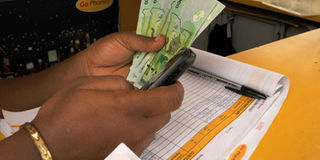Fraud eats into mobile money in 2012

Mobile money, a new money transfer platform, continues to be threatened by fraud and other inefficiencies. FILE PHOTO.
What you need to know:
Susceptible. The mobile money platform has no formal operating guidelines thus being susceptible to fraud.
For a cool three years, mobile money - an electronic money transfer platform - had been credited as a game changer enhancing money transfer systems and the way through which business is conducted.
However, 2012 has been a challenging one for the platform users with a few glitches, including fraud, network failures and a generally inefficient systems delivery.
For starters, MTN Uganda has in 2012 fallen victim to fraud losing billions of shillings with employees conniving to defraud the telecom firm of about Shs10 billion.
The fraud which had been committed earlier, came to light in 2012. However indications reveal that individual subscribers were never affected but the fraud hugely ate into the company’s revenue.
Information available indicates that the telecom’s monitoring and control tools detected the fraud that was internally organised.
As investigations went on, several employees were found culpable with some losing jobs and others getting arrested.
Among the arrested are five former employees who have been charged in courts of law. In an email, Mr Mazen Mroue, the MTN Uganda chief executive officer, told Daily Monitor that the company had been alerted and had put safety controls to guard against fraud.
“We have streamlined our controls to ensure that any further incidents of attempted fraud are curbed,” Mr Mazen said. While MTN was bold enough to expose the fraud, experts say the fraud issue was not only unique to MTN.
They say other mobile money providers have also been affected though minimally. The other mobile money operators, including Airtel Money, M-Sente and Warid Pesa, however, distanced themselves from this saying they have not recorded cases of fraud on their systems.
However, Daily Monitor could not verify any of the claims. The mobile money platform as well experienced some of the worst cases of network failures, most especially during festive seasons and weekends.
Many subscribers have lodged complaints of failing to transact on their accounts for days or even weeks.
According to Mr Geoffrey Mutabazi, the Uganda Communications Commission (UCC) executive director, the issue of service breakdown has been a result of overwhelming uptake of the service compared to expectations.
“These services have been weakened by the high and unexpected uptake from customers. The service capacity has been surpassed and there is an agent need for infrastructure investment. This also applies to other services, including voice and data. As regulator, we are committed to ensuring that telecoms with poor quality services give no excuses in cases of inequality,” Eng Mutabazi said.
However, mobile money continues to register positive growth thus impacting on people’s lives in 2012.
Subscribers numbers shared among the four mobile money providers have grown from under three million last year to more than four million in 2012, surpassing the country’s about 3.5 million bank accounts.
Data confirmed by UCC indicates that MTN holds a lion’s share of over 3.5 million subscribers while the other telecoms share the rest.
The MTN dominancy is related to its wider subscriber numbers and its reach in most parts of Uganda as well as being the pioneer in the mobile money business. Whereas MTN launched its money business in 2009, it had taken other telecom firms more than two years to enter into the business in 2011.
This year, mobile money services went global with MTN Uganda and Western Union forming a partnership that would enable subscribers to transact in more than 200 countries.
Additionally, Warid Pesa in November won a global award for best mobile money service for 2012 at an event held in Dubai.
Mr Shailendra Naidu, the chief operations officer of Warid Uganda, the providers of Warid Pesa related the fast growth of mobile money services to a combination of timing, easiness, and convenience and low costs involved while transacting.
He said: “Mobile money services are going to become even much popular next year and years to follow. People want services that are both cheap and convenient to them. Mobile money leaves next to the customers. But this popularity can only be maintained if we introduce more innovative features on this service.”
Outside Uganda, Kenya’s Safaricom - credited for the large scale adoption of mobile money worldwide in November launched a new mobile banking service that allows users of M-Pesa to save and borrow money (access loans) using phones.
The innovation, which mainly targets micro-savers and borrowers, is expected to further increase mobile money penetration coming off as an alternative to the high interest bank loans. According to Mr Mazen, Uganda’s mobile money sub-sector is moving in the same direction and the country should look out for more innovations.
He said: “We are now working on how to integrate more financial services into our platform and in a few months we hope to announce new and revolutionary financial services on our platform.” The number of mobile money transactions since its inception is estimated at 84.7 million as of 2011, with a total value of Shs3.75 trillion transacted through the platform.
According to information from MTN Uganda, more than 200 million transactions have been recorded in 2012.
However, the mobile money platform continues to operate with no clear regulations and guideline. Whereas UCC regulates telecoms, it does not regulate transactions conducted through mobile money.
However, all mobile money providers are required to have a transacting bank through which all transactions are routed. But amidst all these shortfalls, the future of mobile money looks brighter as mobile phone penetration for 2012 surpassed the 16 million subscribers mark and currently estimated at 17 million, a trend expected to continue.




